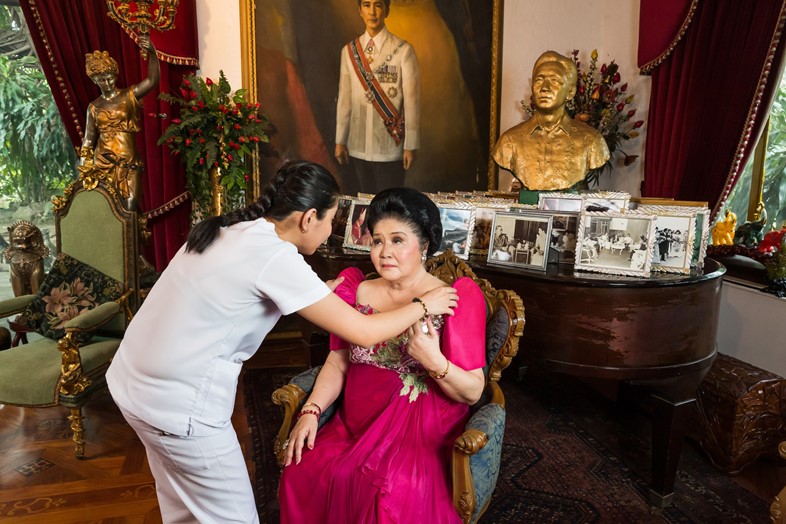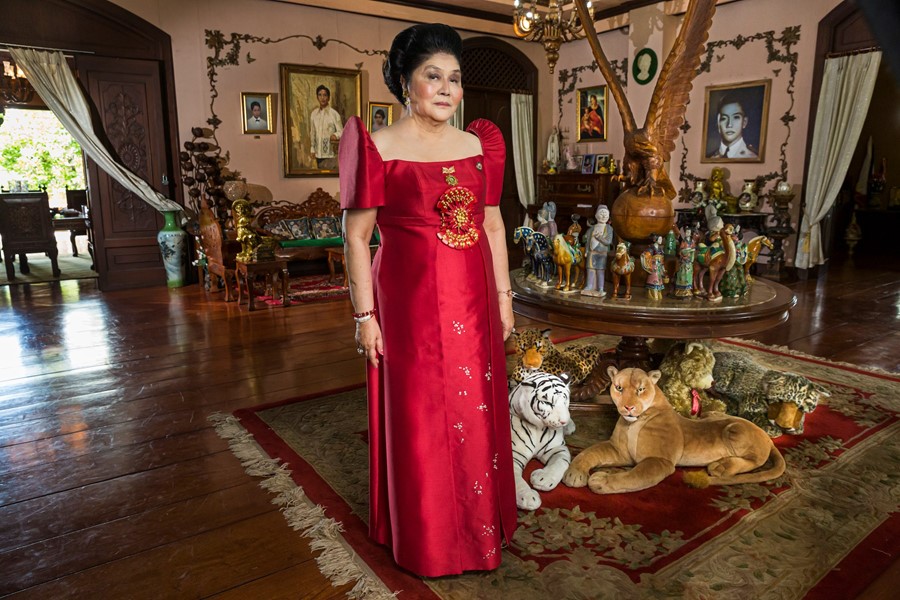The Kingmaker, Lauren Greenfield’s new documentary centres on the indomitable character of Imelda Marcos. “She believes the mythology around her and she’s the creator of it too. Perhaps it’s a form of survival?” says the filmmaker
In the western Pacific, on a remote, reef-fringed isle in the South China Sea, is a scene out of Africa. Created at the whim of dictator Ferdinand Marcos and his wife, Imedla, Calauit is a 14-square-mile stretch of land that houses giraffe, zebra, gazelles and waterbuck illegally imported to the Philippines in the 1970s as part of a ‘conservation project’ by the then First Lady. The history of this reserve, the eviction of its indigenous peoples and the in-breeding of the 104 animals that were shipped over, attracted the attention of Sundance-winning documentary-maker, Lauren Greenfield (The Queen Of Versailles, Generation Wealth). “I read an article in Bloomberg, by a reporter named William Meller, about this animal island that [Imelda] created and was completely blown away,” she says, “It was a kind of ultimate extravagance, people knew about the shoes but this involved living things – indigenous people had been thrown off their land to make room for these African animals. It’s a little known story, but it seemed symbolic of the implications of wealth and power and the excess that goes with it.”
Having spent the last 25 years documenting the impact of consumerism on youth, gender, body image and our wider social mores, Greenfield’s latest feature, The Kingmaker, centres on the indomitable character of Imelda Marcos. Cataloguing the disturbing legacy of the Marcos regime and Imelda’s present-day push to help her son, Bongbong, win the Vice-Presidency, The Kingmaker is by turns a dark, gripping and portentous warning about the power of wealth and political dynasty to undermine democratic norms.

“The first time I met her, it was a little bit of a dream going into her apartment,” says Greenfield. “She wore a pink dress and sat beneath a Picasso. She’s drop-dead beautiful, she wears these incredible traditional dresses with poofy shoulders, she’s extremely tall, incredibly charismatic and generous. She just has this very magnetic presence which has been part of her political magic.” When she first began shooting, Greenfield thought that she might be filming a redemption story, a documentary that would give Marcos space to reflect on the cruelty of her husband’s regime and disavow some of the worst excesses of the exploitation. Instead what emerged was a narrative of history that completely contradicted the factual record. “The more I got into it, her view of history and the Marcos’ contributions did not align with historical accounts or first person witnesses. The movie then became about examining the difference between her story and the truth-tellers, focusing on the ways in which Imelda has begun to convince the public of her account.”
While The Queen Of Versailles and Generation Wealth engaged obliquely with wider socio-political questions, The Kingmaker draws a direct, and chilling, connection between wealth and politics. “There was a kind of, follow the money narrative to the story. The Marcoses have been accused of stealing between five and ten billion dollars from the Filipino people, convicted on many counts, and yet having this money has allowed them to come back, fund campaigns, get back into office. They’re very powerful politically, they’ve used their influence to help bring Duterte into power.” It’s a story, Greenfield says, which ought to have particular resonance for UK and US audiences: “In the US we talk about money being a big part of the political landscape, but we don’t have the opportunity to see money changing hands. Imelda goes out and actually gives money to people, that was one of my first shoots with her. There are so many relevancies to our current political situation. When I began it was more about history and the lessons from history but it quickly shifted to look at how wealth, fake news and the manipulation of the media can impact an election.”
What makes The Kingmaker particularly compelling is that, despite the horrors of Marcos’ delusion, she’s not entirely without sympathy. “I actually think she believes her story,” says Greenfield. “She believes the mythology around her and she’s the creator of it too. Perhaps it’s a form of survival? She doesn’t want to be a bad person and a lot of bad things have happened under her stewardship so maybe it’s the only way she can spin it for herself and for others? She feels completely devoted to the Philippines, she wants to be a benevolent philanthropic mother to all. It reminds me of a scene that we ultimately decided to cut from the film. She was passing out balloons and money to all these kids in a slum outside of a hospital. There was a frenzy and one of the helium balloon strings gets caught around a baby’s neck. That felt really symbolic to me – in her mind she’s doing good, but it comes with often disastrous consequences.”
For Greenfield, the island of Calauit is a metaphor for the dangers of political dynasty and vast, accumulated fortunes. What begins as a well-meaning conservation project, quickly becomes completely divorced from reality, something which displaces locals, disrupts the natural ecology of the land and degenerates into in-breeding, disease and death. “If you don’t remember the past, you’re condemned to repeat it,” the filmmaker says. “When political dynasties are this powerful, they become entrenched. In the Philippines we’re seeing a return to dictatorship, there are street killings again, martial law is beginning to creep back in. Democracies are incredibly fragile and in the course of one election so much can change – it’s a cautionary tale.”
The Kingmaker will screen in select cinemas nationwide from December 13, 2019.
